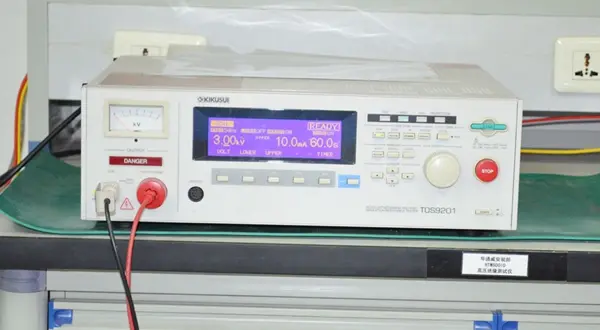
Household Appliance Compliance with EN 60335
EN 60335 is the international standard for "Safety of household and similar electrical appliances," developed by the International Electrotechnical Commission (IEC) and adopted by the European Committee for Electrotechnical Standardization (CENELEC). It is one of the core standards for CE certification in the European Union. The main objective of this standard is to ensure that electrical appliances do not pose risks to personal safety, property, or the environment during normal operation or in the event of a malfunction.

Structure of the EN 60335 Standard
1. General Requirements
Defines fundamental safety specifications, including protection against electric shock, insULation performance, mechanical strength, and temperature rise limits.
2. Particular Requirements
Provides supplementary clauses tailoRED to specific products (e.g., electric irons, kettles, vacuum cleaners), covering special safety needs in design, testing, and use scenarios.
Scope of Application
Applicable Products:
Household and similar electrical appliances, including:
1. Kitchen appliances (e.g., rice cookers, MICrowave ovens, ovens);
2. Cleaning equipment (e.g., vacuum cleaners, washing machines);
3. Personal care devices (e.g., hair dryers, electric shavers);
4. Others such as heaters and air purifiers.
Voltage Limitation:
Primarily applicable to appliances with a rated voltage not exceeding 250V.
Core Safety Requirements
1. Electrical Safety
Includes insulation design, grounding protection, leakage current control, and testing for short circuits and overload protection.
2. Mechanical Safety
Enclosures must resist pressure and impact. Sharp edges, pointed parts, or moving components must not harm users.
3. Thermal Safety
Fire and burn hazards are mitigated via thermal switches or automatic shut-off features, and normal operating temperatures must be limited.
4. Fire and Heat Resistance
Restricts the use of flammable materials, assesses flammability, and includes high-temperature resistance tests to ensure stability under abnormal heat conditions.
5. Electromagnetic Compatibility (EMC)
Compliance with standards such as EN 55014 to minimize electromagnetic interference with other devices.
Testing and Certification Process
1. Design & Development Stage:
Must integrate features for electric shock prevention, overheat protection, and mechanical safety.
2. Test Items:
- Dielectric strength test (to verify insulation);
- Heat resistance and overload testing;
- Waterproof/dustproof tests (for applicable products);
- Radiation and chemical safety tests.
3. Certification Requirements:
Submission of technical documentation (manuals, declaration of conformity, risk assessment reports).
Special Scenario Requirements
1. Water-related appliances (e.g., electric water heaters):
Must emphasize water-electricity separation, temperature control, and abnormal pressure release mechanisms.
2. Kitchen appliances (e.g., induction cookers):
Require additional focus on high-temperature protection and mechanical stability.
Post-Certification Compliance
Once an appliance passes EN 60335 certification, the manufacturer can affix the ce mark on the product and legally sell it in the market. The CE mark indicates conformity with EU safety, health, and environmental protection requirements. To maintain compliance, manufacturers must conduct regular quality control and market surveillance to ensure continuous adherence to the standards.
Email:hello@jjrlab.com
Write your message here and send it to us
 EMC Item – Introduction to Radiated Emission Test
EMC Item – Introduction to Radiated Emission Test
 IEC 62471 Photobiological Safety of Lamps and Lamp
IEC 62471 Photobiological Safety of Lamps and Lamp
 New European Toy Standard EN 71-1:2026
New European Toy Standard EN 71-1:2026
 EN71 Series Standards Compliance February 13, 2026
EN71 Series Standards Compliance February 13, 2026
 European Toy Safety Standard EN 71-20:2025
European Toy Safety Standard EN 71-20:2025
 EN 18031 Certification for Connected Devices on Am
EN 18031 Certification for Connected Devices on Am
 Compliance Guide for Portable Batteries on Amazon
Compliance Guide for Portable Batteries on Amazon
 2026 EU SVHC Candidate List (253 Substances)
2026 EU SVHC Candidate List (253 Substances)
Leave us a message
24-hour online customer service at any time to respond, so that you worry!




